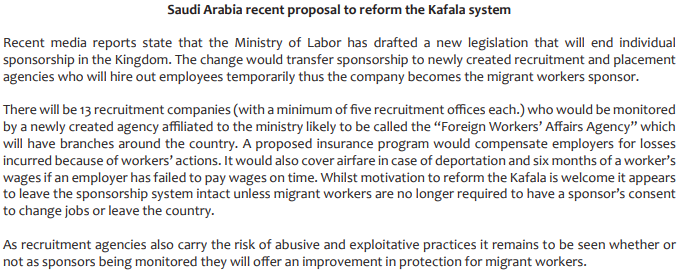Have you ever wondered how theKafala Sponsorship System shapes the lives of millions of migrant workers inthe Gulf? This system, prevalent in countries like Saudi Arabia, Qatar, and theUAE, plays a crucial role in defining the relationship between employers andforeign laborers. While it was initially designed to facilitate labormigration, it has come under scrutiny for fostering exploitation and abuse.Understanding the Kafala Sponsorship System for working in Gulf is essential for anyoneinterested in labor rights and economic development.
The Kafala system, which translatesto "sponsorship" in Arabic, governs the legal status of migrantworkers. Under this framework, a worker's immigration status is tied to theiremployer or "kafeel," creating a power imbalance that often leads tosevere human rights violations.
Understanding the Kafala Sponsorship System
The Kafala Sponsorship Systememerged in the 1950s as a means to regulate labor migration in the GulfCooperation Council (GCC) countries: Bahrain, Kuwait, Oman, Qatar, SaudiArabia, and the UAE. It was intended to provide a temporary workforce duringeconomic booms. However, this system has evolved into a mechanism that oftenresults in exploitation.
Key Features of the Kafala System
- Employer Control: The kafeel has significant control over the worker's immigration status, making it difficult for them to change jobs or leave the country without permission.
- Limited Rights: Workers often lack access to legal protections and are subject to poor working conditions, low wages, and abuse.
- Recruitment Fees: Many migrant workers incur heavy debts due to exorbitant recruitment fees charged by agencies.
Find a Job in Gulf through Recruitment Agencies
For many migrants seekingemployment in the Gulf, recruitment agencies are often the first point ofcontact. These agencies promise job opportunities but can also contribute tothe cycle of exploitation inherent in the Kafala system.
Steps to Secure Employment
- Research Agencies: Look for reputable recruitment agencies with positive reviews.
- Understand Fees: Be aware of any fees involved and ensure they are reasonable.
- Know Your Rights: Familiarize yourself with your rights as a worker under the Kafala system.
Despite these steps, many workersfind themselves trapped in unfavorable conditions due to the restrictive natureof their contracts.

Image from: https://webapps.ilo.org/dyn/migpractice/docs/132/PB2.pdf
Disadvantages of Kafala Sponsorship System in the Gulf
While proponents argue that theKafala system benefits local economies by providing cheap labor, itsdisadvantages are glaring:
- Exploitation: Workers often face long hours without adequate compensation or breaks.
- Abuse: There are numerous reports of physical and emotional abuse by employers.
- Lack of Mobility: Migrants cannot change jobs without their sponsor's consent, limiting their freedom and opportunities.
- Debt Cycle: Many workers arrive with debts incurred from recruitment fees, making them vulnerable to exploitation.
The consequences of thesedisadvantages extend beyond individual workers, they impact families andcommunities back home as well.
Calls for Reform
In recent years, there have beengrowing calls for reforming or abolishing the Kafala Sponsorship System. SomeGCC countries have initiated changes aimed at improving workers' rights:
- Legal Reforms: Countries like Qatar have taken steps to allow workers more freedom to change jobs without needing employer consent.
- Minimum Wage Laws: Some nations have introduced minimum wage laws aimed at ensuring fair compensation for all workers.
- Awareness Campaigns: Efforts are being made to educate both employers and employees about their rights under labor laws.
Despite these efforts, criticsargue that reforms are often poorly enforced and fail to address the systemicissues within the Kafala system.
Conclusion
The Kafala Sponsorship System playsa pivotal role in shaping labor dynamics in the Gulf region. While it hasfacilitated economic growth by providing cheap labor, it has also led towidespread exploitation and abuse among migrant workers. Understanding thissystem is crucial for advocating for better labor rights and protections.
As discussions about reform continue, it isessential for stakeholders including governments, NGOs, and internationalorganizations to push for meaningful changes that prioritize human rights overeconomic gain. The future of millions of migrant workers depends on it.











.webp)
















